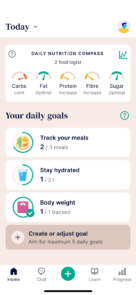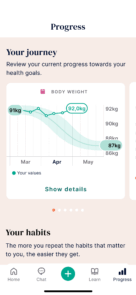
Obesity and pregnancy: understanding and managing health risks
Understanding the link between obesity and pregnancy is an important step towards protecting your health and your baby’s. If you’re planning a pregnancy and want to lose weight, joining a structured weight management programme with support from healthcare professionals can make a real difference.
Oviva offers an NHS-funded programme designed to support safe, sustainable weight loss – and in some cases, access to weight loss medications through the NHS.
Check if you’re eligible for free NHS support with Oviva by speaking to your GP.
Key Takeaways
- Obesity in pregnancy can increase the risk of complications.
- Obesity in this context is typically defined as a BMI over 30 before you get pregnant.
- Losing weight can improve fertility and make it easier to conceive.
- Sensible lifestyle interventions can help you manage risk and lose weight. Before you’re pregnant and after you finish breastfeeding, this can include weight loss medication.

Table of Contents
Can I get pregnant if I’m overweight?
Should I lose weight before trying for a baby?
Tips for losing weight when trying to get pregnant
Can I take weight loss medication if I’m trying for a baby?
Risks during pregnancy and labour
Tips for losing weight when pregnant
How soon after giving birth can I take weight loss medication?
What is considered obese?
Obesity is defined as excessive body fat that presents a risk to health. The most commonly accepted definition uses body mass index (BMI) as a metric.
For most adult women, a BMI of 35 to 39.9 is classed as obese, while a BMI of 40 and above is classed as severely obese. If you’re from an ethnic minority family background, a lower BMI score of 27.5 and above may be classed as obese instead.
Use our free BMI calculator to check your body mass index.
You’re in the underweight range.
It’s advisable to consult a healthcare professional to discuss your weight and receive personalised guidance on improving your nutritional intake.
If you are in the white ethnic group, you’re in the healthy weight range. Continue to maintain a balanced diet and regular physical activity to stay in this healthy range.
If you have an Asian, Chinese, Middle Eastern, Black African or African-Caribbean family background and your BMI is 23 or over, you’re in the overweight range. Consider speaking with a healthcare provider to explore strategies for weight management and assess if any underlying health issues need attention.
If you are in the white ethnic group, you’re in the overweight range. Consider speaking with a healthcare provider to explore strategies for weight management and assess if any underlying health issues need attention.
If you have an Asian, Chinese, Middle Eastern, Black African or African-Caribbean family background and your BMI is 27.5 or over, you’re in the obese range.
You’re in the obese range.
This BMI category may increase your risk of various health conditions.
Oviva’s weight management programme could help if you have a pre-existing medical condition such as heart disease, asthma or type 2 diabetes. Ask your GP to check your eligibility for tailored support from Oviva.
Your BMI indicates severe obesity, which can significantly impact your health.
Oviva’s weight management programme could help if you have a pre-existing medical condition such as heart disease, asthma or type 2 diabetes. Ask your GP to check your eligibility for tailored support from Oviva.
Your BMI indicates severe obesity, which can significantly impact your health. You may qualify for Oviva’s weight management programme even without a pre-existing medical condition. Ask your GP to check your eligibility for tailored support from Oviva.
As an obesity metric, BMI has some flaws, as it measures weight, not body fat. For instance, women with high muscle mass can present as obese, even if their body fat percentage is low. An alternative is to use a waist-to-height ratio.
Your waist-to-height ratio is calculated by dividing your waist circumference by your height using the same unit of measurement. So, for example, if your height is 160 cm and your waist circumference is 103 cm, you would calculate your waist-to-height ratio as follows:
103 ÷ 160 = 0.64
According to the National Institute for Health and Care Excellence (NICE), a ratio of 0.6 or more puts people at the highest risk of developing weight-related health problems.
Getting Pregnant
Many women living with obesity worry about getting pregnant. Here, you can find answers to some of the most common questions and learn about the impact of being overweight on conception.

Can I get pregnant if I’m overweight?
Women can become pregnant when overweight, but obesity can adversely affect your fertility, impacting ovulation in particular. Although you may be able to get pregnant while overweight, your chances will improve if you’re able to reduce your weight. Weight loss is often recommended if you’re living with obesity and struggling to conceive.
How does obesity affect getting pregnant?
Obesity can make it harder to become pregnant by hindering regular ovulation. This then makes it more difficult to conceive naturally or via IVF.
“Weight loss can significantly enhance fertility”, says Yvonne KcKeown, Clinical Lead Nurse for Diabetes and Obesity at Oviva. “Obesity often leads to insulin resistance, disrupting ovulation.
“By achieving a healthier weight, you can improve insulin sensitivity and increase your chances of conception. Additionally, if you’re aiming for fertility treatment, reaching a specific lower BMI might be a requirement to enable access.”

Should I lose weight before trying for a baby?
If you’re planning to become pregnant, losing weight can improve your chances of conceiving and can reduce the risk of complications for yourself and your baby.
If you have a BMI over 35 with certain existing medical conditions like type 2 diabetes or high blood pressure, you may be eligible for weight loss medications on the NHS via an approved weight management service like Oviva.
Oviva supports healthy lifestyle changes alongside medication to help you achieve sustainable weight loss. And you’ll have access to specialists who can help you navigate your weight loss journey and achieve results in a way that makes sense.
This weight loss medication is not suitable if you are pregnant or breastfeeding and you should stop taking the medication at least two months before trying to conceive.
Tips for losing weight when trying to get pregnant
When trying to get pregnant, there are a number of steps you can take to lose weight, including making adjustments to your nutrition and activity levels. That could look like:
- Increasing activity by walking, swimming, or engaging in simple strength training.
- Eating more healthily, focussing on nutritious foods that offer plenty of fibre and lean protein.
If you have tried to lose weight unsuccessfully and have a BMI over 35, you may be eligible for more comprehensive treatment for obesity via a specialist weight management programme like Oviva.

Can I take weight loss medication if I’m trying for a baby?
No, it’s important to stop taking weight loss medication before you start trying to have a baby. You should come off the medication at least two months before trying to conceive.
However, weight loss medication can assist with weight loss prior to trying for a baby and can be beneficial for improving fertility and increasing your chances of conceiving.
While pregnant
In the following sections, you can learn about the potential impact of being obese and pregnant. It should be noted that most women with a BMI over 35 can still have a healthy pregnancy, but the chances of complications increase in line with BMI.
When will my BMI be calculated during pregnancy?
Whether you’re classed as living with obesity during your pregnancy is typically based on your BMI measurements. Your BMI will usually be calculated at the beginning of your pregnancy and again at 36 weeks.

How much weight is normal to gain during pregnancy?
Most women will gain 10 kg to 12.5 kg (22 lbs to 28 lbs) over the course of a pregnancy, although much of this added weight is due to the baby growing. Obesity in pregnancy typically refers to your weight prior to pregnancy. Your midwife or GP may have special advice for you if your BMI was over 35 before you became pregnant.
However, weight gain during pregnancy can vary significantly, and it’s not unusual to fall outside of these weight ranges. Putting on too much weight during your pregnancy can increase the risk of complications developing. This is why attending all appointments and following the advice of GPs, your midwife, and other healthcare professionals is important.
Risks during pregnancy and labour
When you’re living with obesity, pregnancy risks can increase. This includes complications for you and your baby, so it’s important to be aware of possible problems in advance.
Can obesity cause pregnancy complications?
If you’re pregnant and living with obesity, you’re at an elevated risk of experiencing health complications, including high blood pressure, blood clots, gestational diabetes and miscarriage. There is also a higher chance of early birth (delivering your baby before 37 weeks).
When it’s time to deliver your baby, obesity can increase the risk of shoulder dystocia. This is where the baby’s shoulder becomes stuck during delivery, delaying the process. Shoulder dystocia is a risk with all pregnancies, but being obese in pregnancy elevates this risk.
Does my obesity affect my baby?
The majority of women with a BMI over 35 who become pregnant will have a healthy pregnancy. However, obesity does make it more likely your baby will develop certain health issues. Examples of some of the health problems that become more likely include:
- Developmental delay and cognitive issues
- Foetal macrosomia (your baby being significantly larger than average at birth)
- Childhood asthma
- Childhood obesity
- Neural tube defects and other congenital disorders
Being obese during pregnancy also increases the risk of premature birth and stillbirth. Again, it’s important to stress that most women with a BMI over 35 will not encounter these complications, but if you’re living with obesity, pregnancy risks do increase.

Managing the risks of obesity during pregnancy
If you’re living with overweight, getting pregnant comes with some risks, but sensible measures can help. It’s vital to listen to healthcare professionals and follow their advice. You should also try to eat a healthy diet and engage in some sensible daily exercise, like walking or swimming.
Attend all relevant appointments during your pregnancy and report any concerns you have.
Are there any risks during labour?
During labour itself, obesity in pregnancy increases the risk of certain complications, like shoulder dystocia, prolonged labour and postpartum haemorrhage. There is also a heightened risk of stillbirth or your baby being born before 37 weeks.
Will I be able to get specialised prenatal care on the NHS?
You should be referred to a consultant if you have a BMI over 35. During this process, you will receive some specialist care, including a glucose tolerance test and, if necessary, further testing for signs of diabetes during pregnancy (gestational diabetes). If your BMI is over 40, you should also be referred to a specialist midwife at an antenatal clinic.

Tips for losing weight when pregnant
Dieting during pregnancy is not recommended, as it could harm the health of your unborn baby. However, you can make sensible lifestyle adjustments to improve your health.
While you’re pregnant, you may benefit from professional assistance to ensure you’re eating a healthy diet and engaging in a sufficient level of physical activity. You should try to eat a balanced diet with plenty of fruit, vegetables, protein and fibre.
It’s important to know physical activity during pregnancy, like walking and swimming, is healthy and will not harm your baby. If you were not active before becoming pregnant, speaking to a healthcare professional to discuss recommended exercises can be a good idea.
Postpartum
After you’ve had your baby, you may wish to lose weight. However, ensuring you’re using the right methods is crucial, especially while breastfeeding.

How soon after giving birth can I take weight loss medication?
GLP-1 agonist medications should not be taken when breastfeeding, as it’s not yet fully understood whether these medications can pass into breast milk. Once you’ve finished breastfeeding your baby, you can begin treatment with a weight loss medication if you’re eligible.
Tips for losing weight after having a baby
It’s best to try to achieve weight loss after having a baby through a combination of diet and exercise first. However, exploring weight loss medication after you’ve finished breastfeeding may also be beneficial, depending on your BMI.
GLP-1 agonist medication works by suppressing your appetite, so you naturally eat less. This can achieve excellent results when combined with increased movement and sensible nutrition.
Participating in an approved weight loss management programme, like Oviva, may enable obtaining weight loss medication via the NHS.
How Oviva is helping women living with obesity
Oviva’s weight management programme is specifically tailored to your individual needs. We work with women to manage obesity and can assist with pregnancy planning, creating a realistic plan of action for weight loss.
Our service includes personal coaching, an app that tracks nutrition, exercise, and mental health, and weight loss medication at appropriate times for those who are eligible. It’s important to stress that weight loss medication is not suitable if you’re actively trying to have a baby, if you’re pregnant, or if you’re currently breastfeeding.
We can support your weight loss journey through coaching, dietary guidance and, potentially, weight loss medication. However, it’s crucial to use effective contraception while on weight loss medication, and it’s not safe during pregnancy due to a lack of clinical trial data.
Yvonne McKeown, Clinical Lead Nurse for Diabetes and Obesity at Oviva

Although it’s possible for women living with obesity to get pregnant and have a pregnancy free from complications, it’s recommended to consider losing weight before trying for a baby. This can have benefits in terms of fertility, your own health and the health of your baby.
This is where Oviva can help. Our comprehensive weight management programme offers expert support, including weight loss medication when appropriate.







